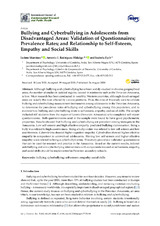Bullying and Cyberbullying in Adolescents from Disadvantaged Areas: Validation of Questionnaires; Prevalence Rates; and Relationship to Self-Esteem, Empathy and Social Skills
Autor
Martínez, Jacinto
Rodríguez Hidalgo, Antonio Jesús
Zych, Izabela
Editor
MDPIFecha
2020Materia
BullyingCyberbullying
Self-esteem
Empathy
Social skills
METS:
Mostrar el registro METSPREMIS:
Mostrar el registro PREMISMetadatos
Mostrar el registro completo del ítemResumen
Although bullying and cyberbullying have been widely studied in diverse geographical areas, the number of studies in isolated regions, located in rainforests such as the Peruvian Amazonia, is low. Most research has been conducted in wealthy, Western countries, although disadvantaged areas are usually the most affected by various problems. Thus, the aims of this study were to validate bullying and cyberbullying measurement instruments among adolescents in the Peruvian Amazonia, to determine the prevalence rates of bullying and cyberbullying among this population, and to examine how bullying and cyberbullying relate to self-esteem, empathy, and social skills. The sample included 607 students from the region of Loreto (Peruvian Amazonia) who completed self-report questionnaires. Both questionnaires used in the sample were found to have good psychometric properties. Results showed that bullying and cyberbullying are prevalent among teenagers in the Amazonia. Low self-esteem and high affective empathy predicted bullying victimization. Being a bully was related to high assertiveness. Being a bully-victim was related to low self-esteem and low assertiveness. Cybervictims showed higher cognitive empathy. Cyberbullies showed higher affective empathy in comparison to uninvolved adolescents. Having low self-esteem and higher affective empathy were related to being a cyberbully/victim. This study provides a validated questionnaire that can be used for research and practice in the Amazonia. Based on the current results, tailored anti-bullying and anti-cyberbullying interventions with components focused on self-esteem, empathy, and social skills should be implemented in Peruvian secondary schools.

